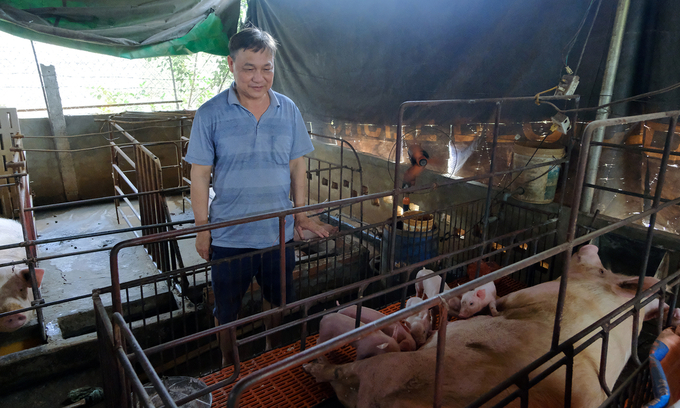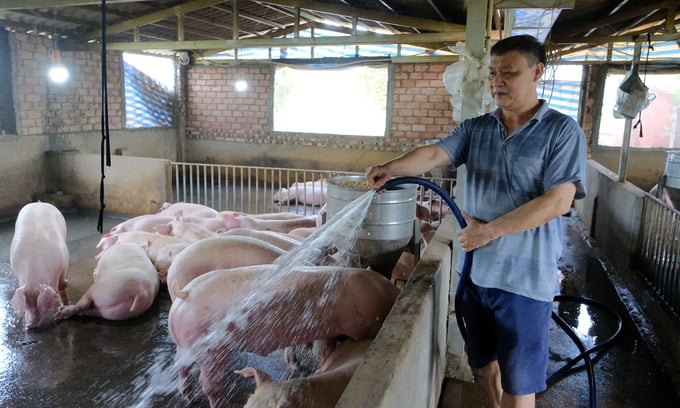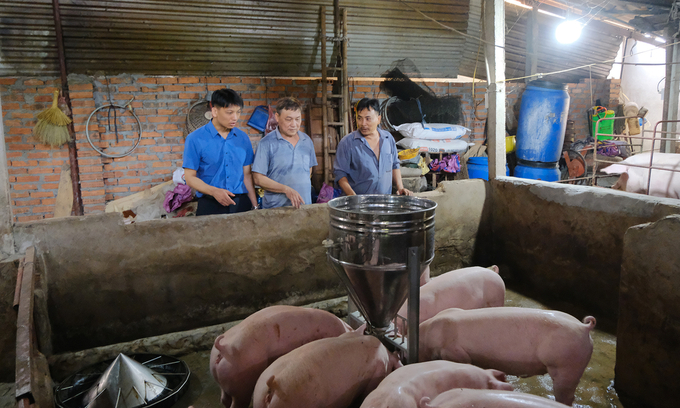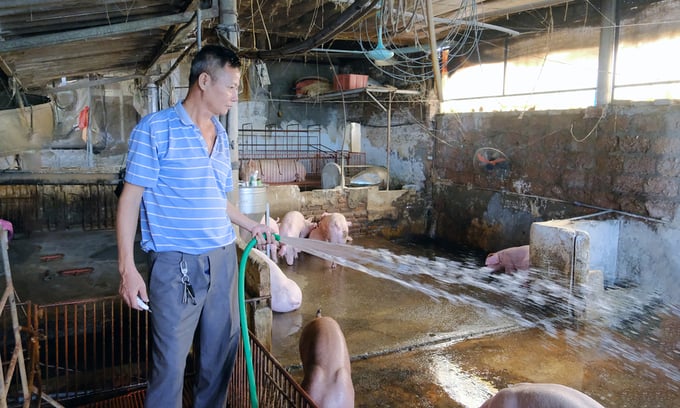June 21, 2025 | 03:43 GMT +7
June 21, 2025 | 03:43 GMT +7
Hotline: 0913.378.918
June 21, 2025 | 03:43 GMT +7
Hotline: 0913.378.918

Mr. Le Viet The tested the ASF vaccine on the pigs in his farming household. Photo: Bao Thang.
Farmers in Dich Trung village, Phuong Dinh commune, Dan Phuong district, Hanoi, have long been concerned about the African Swine Fever.
When the African Swine Fever broke out on a large scale a few years ago, many small household farmers in the area suffered heavy losses because their infected pigs could not be cured. Many infected pig carcasses were buried along the Song Phuong dike.
The African Swine Fever recently broke out at the end of 2022, causing substantial economic losses to local farmers. On the other hand, pig farmers were hesitant to re-herd because vaccines, the key preventive measure against the disease, have only been distributed and used under strict supervision in select areas across the country. Additionally, special medicines for the disease are not widely available, and the disease transmission route is difficult to monitor.
Similar to many other pig farmers in the area, Mr. Le Viet The from Dich Trung village, is experienced in handling the African swine fever. With an extensive background in livestock production, as well as knowledge and expertise in animal, Mr. The strictly implements biosecurity in his farm with over 100 pigs. Moreover, he constantly monitors and improves the resistance of pigs.
"Around 90% of pig farms in Phuong Dinh were infected in 2020. To protect their pig herds, pig farmers were very strict about letting strangers into the farm", Mr. The shared his story.
The epidemic was a tragic event for many, but it was also an opportunity for Mr. Le Viet The to prove his talent. No pig in his farm has ever been infected over the years. His pig herd grows healthily because the farming area serves as an impenetrable barrier against diseases.
When asked about his secret of pig farming to achieve such an feat, the 60-year-old man laughed and explained: "I never let strangers into my farm in the past. Everytime I enter or exit the farming area, I have to disinfect, wear boots, wear protective clothing, etc. But thanks to the vaccines, anyone can now safely enter".

Mr. The puts great efforts into cleaning the farm to ensure a disease-free environment. Photo: Pham Hieu.
Mr. The guided the news reporters to visit his clean, hygienic breeding area. During the sunny weather of early May, the air in the barn was cool thanks to the carefully arranged and multi-layered insulation system of canvas and foam.
Livestock production in Vietnam is small and segmented. Farming households account for the majority of livestock producers. Due to their open farming environment, farming households located in residential areas face difficulties in preventing and controlling the spread of diseases. Mr. The suggested the "four no's" in response to these issues.
Firstly, avoid purchasing pigs of unknown origin, without a transport quarantine certificate issued by an Animal Health agency. Secondly, actively source disease-free breeding stock from broodstock. Thirdly, avoid using leftovers from restaurants, industrial kitchens, and food must be carefully heat treated. Fourthly, avoid using untreated water from ponds, lakes, canals and ditches to bathe and feed pigs.
Thanks to these drastic measures, Mr. The's pig herd was safe from the African Swine Fever. However, Mr. The believes that vaccination is still necessary, having witnessed the devastation of African Swine Fever on neighboring farms first-hand.
Upon learning that AVAC Vietnam Joint Stock Company was testing a vaccine against African Swine Fever, Mr. The contacted the company to enroll his farm in the vaccination testing program.
"Many people were doubtful at first. But since the vaccination in July and August of 2022, my pigs have been immune to African swine fever", Mr. The shared excitedly.

Mr. Nguyen Van Diep, General Director of AVAC Vietnam Joint Stock Company, and Mr. Le Viet The inspecting the health of pigs after their vaccination against ASF. Photo: Bao Thang.
M any small farming households in Dich Trung hamlet are anticipating the ASF vaccines, but not everyone has the courage to take the first step like Mr. Le Viet The.
Mr. Pham Manh Tien lost all of his pigs in the 2022 African Swine Fever outbreak. Despite the recovering pig prices during the Lunar New Year, Mr. Tien hesitated to re-herd out of fear for another ASF epidemic.
Mr. Tien only started rebuilding his farm after learning that the second batch of Mr. The's pigs were healthy after vaccination. His farm has grown from a few stock pigs to 50 healthy pigs.
"I was extremely worried when I started re-herding. But I put my trust in the vaccines, and in Mr. The's advice. As a result, my pigs are now healthy and ready for sale", Mr. Tien confided.
Mr. Nguyen Van Hai, another farmer with a 30-pig herd in Dich Trung village, claimed that the vaccines have reassured him. Because livestock is the main source of income for his family and the price of animal feed skyrocketed, Mr. Hai almost changed his career during the epidemic. However, the current healthy and growing pig herd has encouraged him to continue farming.
Mr. The has mobilized over 30 farmer households in Phuong Dinh commune to vaccinate their pigs with the AVAC ASF LIVE vaccine produced and supplied by AVAC Vietnam Joint Stock Company. Approximately 1,300 pigs have received the vaccination so far, all of which were closely monitored before, during, and after the procedure. Subsequently, all of the pigs were reported to be healthy without signs of side effects.

Mr. Nguyen Van Hai was encouraged to re-herd thanks to the AVAC ASF LIVE vaccine. Photo: Pham Hieu.
Mr. Le Viet The continued to test the AVAC ASF LIVE vaccine on sows and piglets, with dosage as guided by the AVAC Vietnam Joint Stock Company.
After 2 batches of vaccinations, Mr. The reported that there were no significant changes in the the fertility of the sow, and the piglets grew healthily. According to test results, sows and piglets retain antibodies for three to four months after receiving their vaccination. This is consistent with AVAC's claims that the vaccine's protection period last for approximately four months.
Mr. The advised on keeping pigs healthy after vaccination: "It is important that you get authentic vaccines rather than imitations. I always place my order with the company and then carefully examine the packaging, labels, preservation methods upon receipt of goods".
Testing the ASF vaccine on smallholder farmers is an important step to assess the effectiveness of the vaccine. When Vietnam first announced the successful production of this vaccine by Navetco Company, the Ministry of Agriculture and Rural Development and the Department of Animal Health emphasized that the importance of farmers' benefits.
AVAC Joint Stock Company has recently supplied and tested over 700,000 doses of AVAC ASF LIVE vaccine in 32 provinces and cities. Deputy Minister Phung Duc Tien inspected a processing facility under the CP Vietnam Livestock Joint Stock Company in early February 2023. The AVAC ASF LIVE vaccine was successfully deployed in the facility to outstanding results.
Mr. Nguyen Van Diep, General Director of AVAC Vietnam Joint Stock Company pledged: "We will continue to improve technology, research to further enhance the protection strength of vaccines, optimize prices, and expand vaccination targets to sows and piglets”.
In addition to the correct administration method and dosage as recommended by AVAC Vietnam Joint Stock, Mr. Le Viet The recommends farmers to regularly monitor pigs within 2 weeks after vaccination. According to him, vaccinated pigs often have higher fever during the second week. As a result, farmers should still be careful even if their pigs only showed mild symptoms during the first week. In addition, pigs must be given anti-fever electrolytes for 15 days. Farmers should immediately alert the local authorities if an abnormal occurences were found.
Translated by Nguyen Hai Long
![Turning wind and rain into action: [9] Digitizing hydrometeorological data in response to climate change](https://t.ex-cdn.com/nongnghiepmoitruong.vn/608w/files/news/2025/06/17/z6704423696987_15fd32ffc26d590d204d520c9dac6786-nongnghiep-165943.jpg)
(VAN) Farmers have begun accessing hydrometeorological applications to adjust their cropping schedules, aiming to ensure productivity and adapt to climate change.
![Turning wind and rain into action: [8] Real-time salinity detection and early warning technology](https://t.ex-cdn.com/nongnghiepmoitruong.vn/608w/files/news/2025/06/17/z6704423696987_15fd32ffc26d590d204d520c9dac6786-nongnghiep-151127.jpg)
(VAN) Thanks to the integration of modern hydrological-hydraulic models, remote sensing technologies, and artificial intelligence, the accuracy of hydrological forecasting has significantly improved.
![Turning wind and rain into action: [7] Early disaster warnings help marine farmers minimize losses](https://t.ex-cdn.com/nongnghiepmoitruong.vn/608w/files/news/2025/06/17/z6704423696987_15fd32ffc26d590d204d520c9dac6786-nongnghiep-142942.jpg)
(VAN) In recent years, thanks to early disaster warnings and forecasting, marine farmers in Khanh Hoa province have been able to reduce risks and losses, thereby improving production efficiency.
![Turning wind and rain into action: [6] ‘Four on-the-spot’ disaster management software](https://t.ex-cdn.com/nongnghiepmoitruong.vn/608w/files/news/2025/06/17/e5a48259d6a262fc3bb3-nongnghiep-183800.jpg)
(VAN) By simply activating the scenario on the disaster management software, the relevant authorities immediately know how many households need to be evacuated, where to evacuate them to, and by what means of transportation…
![Turning wind and rain into action: [5] Hue applies modern technology in disaster forecasting](https://t.ex-cdn.com/nongnghiepmoitruong.vn/608w/files/news/2025/06/17/z6704423696987_15fd32ffc26d590d204d520c9dac6786-nongnghiep-093938.jpg)
(VAN) In Hue city, modern technology has recently been applied in meteorological and hydrological forecasting and warning, helping to reduce the damage caused by natural disasters.

(VAN) A cutting-edge farming technique being implemented on an experimental ranch in Arizona's Sonoran Desert has already saved a billion gallons of water over five years, according to Civil Eats.

(VAN) Poultry and pig production and the environment can be boosted through enhanced water technology, according to new research.